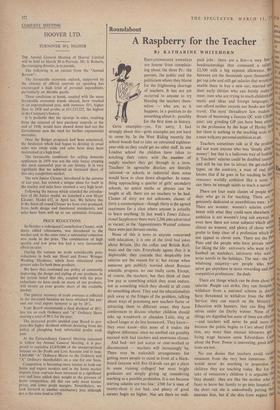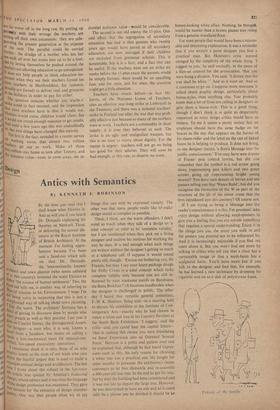'4Ie
Roundabout
A Raspberry for the Teacher
By KATHARINE WHITEHORN
EDUCATIONALISTS nowadays are hoarse from complain-
ing about the three Ps:' the parents, the public and the politicians whom they blame for the frightening shortage of teachers. It has not yet occurred to anyone to try blaming the teachers them- selves — who are, as it happens, in a position to do something about it: possibly for the first time in history.
Grim examples—yes, I'm sorry, I feel strongly about this—grim examples are not hard to come by. In the West Riding recently the school boards had to take on untrained eighteen- year-olds as they could get no other staff. In one London school the children .have taken to notching their rulers with the number of supply teachers they get through in a term. Teachers in agreeable districts are literally rationed—or schools in industrial slum areas would have to close down altogether. In some- thing approaching a quarter of girls' secondary schools, no senior maths or physics can be taught at all; there are no teachers to be had. Classes of sixty are not unknown, classes of forty a commonplace—though thirty is the agreed maximum for a class where anyone is actually to learn anything. In last week's Times Educa- tional Supplement there were 3,206 jobs advertised as vacant; in the 'Appointments Wanted' column there were just thirteen entries.
None of this is news to anyone concerned with education; it is one of the tired bad jokes about Britain. like the coffee and British Rail- ways and the rain. Everybody agrees that it is deplorable; they concede that despicably low salaries are the reason for it; but except when someone gets publicly worried about Russian scientific progress, no one really cares. Except, of course, the teachers; but they think of their low pay as something which they must endure, not as something which they should at all costs do something about. They and the educationalists pick away at the fringes of the problem, talking about ways of processing new teachers faster or attracting them to different areas; they have conferences to discuss whether children should take up woodwork or abandon Latin, stay at school longer or do less homework. They know— they must know—that none of it makes the slightest difference, since no method can possibly succeed with bad teachers and enormous classes.
And bad—not just scarce or over-worked or discontented — teachers will increasingly be. There may be makeshift arrangements for getting more people to stand in front of a black- board (anyone with five 0-levels can get a place in some training colleges)' but most bright graduates are simply giving up, considering teaching as a possible profession. It is not because starting salaries are too low : £500 for a man of twenty-three is not bad, and plenty of good careers begin no higher. Nor are there no well- and teac It d Port Soui acts t paid jobs: there are a few—a very few headmasterships that command a salary £2,500 with a big expense allowance. But between are the thousands upon thousands A`. get top jobs and still get salaries that would ne enable them to buy a new car; married gle their early thirties who can barely make e meet; men who are trying to teach children a music and ideas and foreign languages, can afford neither records nor books nor for' travel. The most threadbare law student dream of becoming a famous QC with £30,0° year; any grinding GP can have been attract to the profession by the hope of Harley Str but there is nothing in the teaching scale 10 a man with any personal ambition at all.
Teachers sometimes talk as if the profess' did not want anyone who was 'simply after money'; but that is a ludicrous way of looking it. Teachers' salaries could be doubled tomorr°, and still be too low to attract the get-rich-e., types; on the contrary, a man of real 0111; knows that if he goes in for teaching he has renounce worldly ambition like a saint; b can there be enough saints to teach a nation?
There are four main classes of people now days who go in for teaching. There are genuinely dedicated or unambitious men : a WI There are women: women's salaries corill9 better with what they could earn elsewhere, a ambition is not 'women's long suit anyway. It, even here there are some subjects which OP almost no women; and plenty of clever wont' prefer to keep clear of a profession which d not appeal to clever men. There are the Pelci Pans and the people who have private reaso for liking the life: extroverts who want to 11131 football on weekdays, introverts who want t write novels in the holidays. The rest—the ov whelming majority—are people who swill never get anywhere in more rewarding and ru0 competitive professions : the duds.
There are things which can be done about 10 salaries. People can strike, they can threaten withdraw from a national scheme as doel° have threatened to withdraw from the Healy Service; they can march on the Ministry Education with banners, they can fling the selves under the Derby winner. None of things are dignified but some of them are effect' —and teachers will never be paid more ln because the public begins to Care about Edu tion, any more than manual labourers gel living wage because some Edwardians COP,
, about the Poor. Power is interesting; good int° tions are not.
No one denies that teachers avoid violent measures from the very best intentions: the' would never do anything to jeopardise Ile children they are teaching today. But for ite sake of tomorrow's children it is arguable 11131 they should: they • are like the mother who re' fuses to leave her family to go into hospital : 111 the short run she is undoubtedly putting the° interests first, but if she dies from neglect 'bey are far worse off in the long run. By putting up PatialKlY with their wrongs the teachers are cutting off their own succession: they are safe- guarding the present generation at the expense 4." the next. The parallel could be carried gather: the drudge of a mother who lets her son walk all over her trains him up to be a lout; 341 d by letting themselves be pushed around the teIt achers are allowing education to go unrespected. does not help people to think education im- Portant when they see their teachers forced (as S°Ine teachers in Hertfordshire, for instance, actually are forced) to deliver coal and groceries holidays in order to pay for either. The question remains whether any teache:s' strike could in fact succeed; and the impression that most teachers have is that it would not. r!'lothers would curse, children would cheer, but it Would not create enough nuisance to get results. And Until a few years ago this was undoubtedly so, gut two things have changed this entirely. The first is the fact, revealed in a recent survey on working - mothers wives, that almost two million go out to work. Make all those IWo million stay home to look after Tommy, and the nuisance value—even, in some areas, the in- Of dustrial nuisance value—would be considerable.
The second is our old enemy the 11-plus. One odd effect that the segregation of secondary education has had is that parents who twenty years ago would have jeered at all secondary education, are now outraged if their children are excluded from grammar schools. This is lamentable, but it is a fact; and a fact that can be useful. If the teachers went out on strike six weeks before the 11-plus exam the parents would be simply furious; there would be an appalling fuss, and for once, just for once, the question might get 4k little attention.
Teachers have struck before—in fact Mr. Jarvis, of the National Union of Teachers, cites an effective year-long strike in Lowestoft in the Twenties; and there was a national teachers' strike in Finland just after the war that was prob- ably effective just because so many of the mothers were at work. Teachers are a commodity in short supply; it is time they behaved as such. The 'strike is an ugly and undignified weapon, but this is no time to worry about dignity. For the matter is urgent : teachers will not go on being too good for their salaries. They will soon be bad enough, at this rate, to deserve no more.











































 Previous page
Previous page